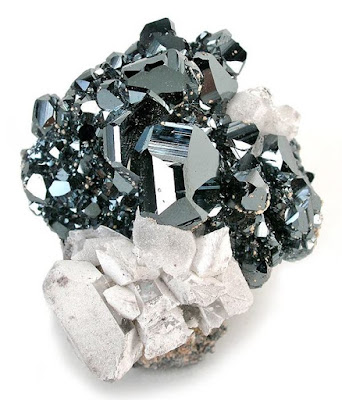Today (November 17, 2000) is the Memorial Day of Louis Eugene Felix Neel the winner of the Nobel Prize in Physics for his study of the magnetic properties of solids.


Louis Eugene Felix Neel was born on November 22, 1904, in Illinois,
France. He attended Lycee du Parc in Eleanor. He then studied at the Ecole
Normale Supérieure in Paris. He then received his doctorate in science from the
University of Strasbourg. He received the Nobel Prize in Physics in 1970 for
his study of the magnetic properties of solids. The study of solid magnetic
properties led to many advances in computer memory. Around 1930 he said that
there might be a whole new kind of magnetism. This is called
antiferromagnetism. Like an iron magnet, but the magnetic atoms inside an
object stand in the opposite direction without a magnetic field in the same direction
and are almost devoid of magnetism. But will have some magnetism at lower
temperatures.


This magnetic field is lost as the temperature rises. In 1947 he
discovered a similar, but slightly opposite magnetic field characteristic of ferrous iron. This microscopic iron magnetism also disappears as the blue
temperature rises. Louis Neel also described the soft magnetism found in rocks.
The result of his study is the history of the magnetic field of the globe.
Ferrimagnetism is a type of soft electromagnetism found in some solids. The
magnets of the iron cells in the iron stand in the same direction. But the
direction of the magnetic field of the atoms in the material, which is called a
magnetic iron magnet, can be opposite.


The magnetic field of some atoms is accidental in one direction and the
magnetic field of others is in the opposite direction, although below a certain
Curie temperature, these opposite magnets can show magnetism in one direction
only. Magnetite and iron oxide (Fe3O4) belong to this type of small magnetic
iron magnet.



The microscopic iron magnet, like the iron magnet, automatically has a
magnetic field below the Curie temperature but also has magnetic elements
standing in opposite directions. Below the Curie temperature, there is a
magnetization compensation point where the magnetic moment of the crystals in
the material is exactly the opposite. Apart from this, there is also a position
called the angular momentum offset point. This condition allows the magnetic
field to change direction rapidly. Louis Eugene Belle Neel, the winner of the Nobel
Prize in Physics for his study of the magnetic properties of solids, died in
France on November 17, 2000, at the age of 95.
Source By: Wikipedia
Information: Dr. P. Ramesh, Assistant Professor of Physics, Nehru Memorial
College, Puthanampatti, Trichy.
Get information like this
https://t.me/joinchat/jpqj3jQLN51kYTk9
Join Telegram Group.
https://chat.whatsapp.com/HHC5m0Jz3Ue1E8ilgta0YT
Join WhatsApp Group
Thanks.
.jpeg)
.png)
.jpg)
No comments:
Post a Comment